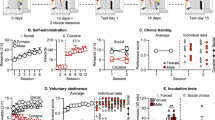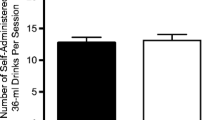Abstract
The reinforcing and subjective effects of two doses of ethanol [0.5 g/kg (LOW) and 0.8 g/kg (HIGH)] were evaluated under two conditions, a social condition (SOC), in which subjects were tested with two or three other subjects, and a socially isolated condition (ISO), in which subjects were tested alone. Forty-one social drinkers participated in a double-blind, seven-session choice procedure. Subjects were randomly assigned to one of four experimental groups: SOC-LOW, SOC-HIGH, ISO-LOW, or ISO-HIGH. On the first four sessions, subjects sampled ethanol (0.5 or 0.8 g/kg) on two occasions and placebo on the other two occasions. On the three remaining sessions, subjects selected and consumed whichever of the two previously sampled substances they preferred. The number of sessions on which they chose ethanol was the primary measure of the reinforcing effects of ethanol. Standardized self-report questionnaires and a psychomotor test were used to measure subjective and objective drug effects. Subjects in the SOC condition chose ethanol over placebo on significantly more sessions than subjects in the ISO condition. Ethanol produced positive subjective effects (e.g., increased ratings of drug liking and euphoria) for subjects in the SOC condition, but for subjects in the ISO condition, it produced apparently negative effects (e.g., increased ratings of dysphoria). These results extend previous reports that the behavioral effects of ethanol depend upon the social condition in which it is consumed.
Similar content being viewed by others
References
American Psychiatric Association (1987) Diagnostic and statistical manual of mental disorders. Edn III, revised. American Psychiatric Association, Washington DC
Caudill BD, Marlatt GA (1975) Modeling influences in social drinking: an experimental analogue. J Consult Clin Psychol 43:405–415
Del Porto JA, Masur J (1984) The effects of alcohol, THC and diazepam in two different social settings. A study with human volunteers. Res Commun Psychol Psychiatry Behav 9:201–212
Derogatis L (1983) SCL-90-R Manual-II. Clinical psychometric research, Towson, MD
Foltin RW, Fischman MW (1991) Assessment of abuse liability of stimulant drugs in humans: a methodological survey. Drug Alcohol Depend 28:3–48
Griffiths RR, Bigelow GE, Liebson I (1975) Effects of ethanol self-administration on choice behavior: money vs. socializing. Pharmacol Biochem Behav 3:443–446
Haertzen CA, Hill HE, Belleville RE (1963) Development of the Addiction Research Center Inventory Scales (ARCI): selection of items that are sensitive to the effects of various drugs. Pschopharmacologia 4:155–166
Heishman SJ, Stitzer ML (1989) Effect ofd-amphetamine, secobarbital, and marijuana on choice behavior: social versus nonsocial options. Psychopharmacology 99:156–162
Higgins ST, Stitzer ML (1988) Time allocation in a concurrent schedule of social interaction and monetary reinforcement: effects ofd-amphetamine. Pharmacol Biochem Behav 31:227–231
Higgins ST, Hughes JR, Bickel WK (1989) Effects ofd-amphetamine on choice of social versus monetary reinforcement: a discrete-trial test. Pharmacol Biochem Behav 34:297–301
Johanson CE, Uhlenhuth EH (1980) Drug preference and mood in humans: diazepam. Psychopharmacology 71:269–273
Lindfors B, Lindman R (1987) Alcohol and previous acquaintance: mood and social interactions in small groups. Scand J Psychiatry 28:211–219
Lindman R (1982) Social and solitary drinking: effects on consumption and mood in male social drinkers. Physiol Behav 28:1093–1095
Martin WR, Sloan JW, Sapira JD, Jasinski DR (1971) Physiologic, subjective and behavioral effects of amphetamine, methamphetamine, ephedrine, phenmetrazine, and methylphenidate in man. Clin Pharmacol Ther 12:245–258
McNair DM, Lorr M, Droppleman LF (1971) Profile of mood states (Manual). Educational and Industrial Testing Service, San Diego, CA
Parrott AC, Hindmarch I (1980) The Leeds Sleep Evaluation Questionnaire in psychopharmacological investigations — a review. Psychopharmacology 71:173–179
Pliner P, Cappell H (1974) Modifications of affective consequences of alcohol: a comparison of social and solitary drinking. J Abnorm Psychol 83:418–425
Sher KJ (1985) Subjective effects of alcohol: the influence of setting and individual differences in alcohol expectancies. J Stud Alcohol 46:137–146
Schuster CR, Fischman MW, Johanson CE (1981) Internal stimulus control and subjective effects of drugs. In: Johanson CE, Thompson T (eds) Behavioral pharmacology of human drug dependence. Natl Inst Drug Abuse Res Monogr Ser 37, US Govt Printing Office, Washington DC, pp 116–129
Stitzer ML, Griffiths RR, Bigelow GE, Liebson I (1981) Human social conversation: Effects of ethanol, secobarbital and chlorpromazine. Pharmacol Biochem Behav 14:353–360
Wechsler D (1958) The measure and appraisal of adult intelligence. Williams and Wilkins, Baltimore, MD
Author information
Authors and Affiliations
Rights and permissions
About this article
Cite this article
Doty, P., de Wit, H. Effect of setting on the reinforcing and subjective effects of ethanol in social drinkers. Psychopharmacology 118, 19–27 (1995). https://doi.org/10.1007/BF02245245
Received:
Revised:
Issue Date:
DOI: https://doi.org/10.1007/BF02245245




